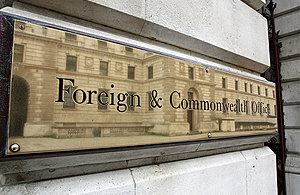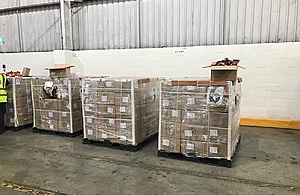Government launches NHS Test and Trace service
- NHS Test and Trace service to form a central part of the government’s coronavirus recovery strategy
- Anyone with symptoms will be tested and their close contacts will be traced
- New guidance means those who have been in close contact with someone who tests positive must isolate for 14 days, even if they have no symptoms, to avoid unknowingly spreading the virus
The new NHS Test and Trace service will launch tomorrow (Thursday 28 May) across England, the government announced.
The service will help identify, contain and control coronavirus, reduce the spread of the virus and save lives.
From tomorrow, anyone who tests positive for coronavirus will be contacted by NHS Test and Trace and will need to share information about their recent interactions. This could include household members, people with whom they have been in direct contact, or within 2 metres for more than 15 minutes.
People identified as having been in close contact with someone who has a positive test must stay at home for 14 days, even if they do not have symptoms, to stop unknowingly spreading the virus.
If those in isolation develop symptoms, they can book a test at nhs.uk/coronavirus or by calling 119. If they test positive, they must continue to stay at home for 7 days or until their symptoms have passed. If they test negative, they must complete the 14-day isolation period.
Members of their household will not have to stay at home unless the person identified becomes symptomatic, at which point they must also self-isolate for 14 days to avoid unknowingly spreading the virus.
Health and Social Care Secretary Matt Hancock said:
As we move to the next stage of our fight against coronavirus, we will be able to replace national lockdowns with individual isolation and, if necessary, local action where there are outbreaks.
NHS Test and Trace will be vital to stopping the spread of the virus. It is how we will be able to protect our friends and family from infection, and protect our NHS.
This new system will help us keep this virus under control while carefully and safely lifting the lockdown nationally.
NHS Test and Trace brings together 4 tools to control the virus:
- test: increasing availability and speed of testing will underpin NHS Test and Trace.
- trace: when someone tests positive for coronavirus the NHS Test and Trace service will use dedicated contact tracing staff, online services and local public health experts to identify any close recent contacts they’ve had and alert those most at risk of having the virus who need to self-isolate. This will be complemented by the rollout of the NHS COVID-19 App in the coming weeks.
- contain: a national Joint Biosecurity Centre will work with local authorities and public health teams in Public Health England (PHE), including local Directors of Public Health, to identify localised outbreaks and support effective local responses, including plans to quickly deploy testing facilities to particular locations. Local authorities have been supported by £300 million of new funding to help local authorities develop their own local outbreak control plans.
- enable: government to learn more about the virus, including as the science develops, to explore how we could go further in easing infection control measures.
The NHS Test and Trace service, including 25,000 dedicated contact tracing staff working with Public Health England, will have the capacity to trace the contacts of 10,000 people who test positive for coronavirus per day and can be scaled up if needed.
The rollout of the NHS Test and Trace service has been made possible by the rapid expansion of testing. The largest network of diagnostic testing facilities in British history has been created and will soon have the capacity to carry out 200,000 tests a day. This includes 50 drive-through sites, more than 100 mobile testing units and 3 mega laboratories.
People who are contacted by the NHS Test and Trace service will be given clear information explaining what they must do and how they can access local support if needed. Guidance is also available online at gov.uk/coronavirus. This comes as the Department for Work and Pensions has announced that those having to self-isolate will be eligible for statutory sick pay if they are unable to work from home. This applies across the four nations of the UK.
Dido Harding, Executive Chair of NHS Test and Trace, said:
This is a brand new service which has been launched at incredible speed and scale. NHS Test and Trace already employs over 40,000 people, both directly and through trusted partners, who are working hard to deliver both testing and contact tracing at scale. This is no small achievement and I am hugely grateful to everyone involved.
NHS Test and Trace will not succeed on its own – we all need to play our part. This is why we are working hand-in-hand with communities and local authorities across the country to tailor support at a local level, and respond quickly to local needs. And we will be constantly developing and improving as we go. Together we can help contain the virus, stop it spreading further and ultimately save lives.
The government has also today expanded testing availability for children aged under 5, to help support the phased opening of schools and childcare settings in England from 1 June. From tomorrow, all symptomatic individuals in England will be able to access a test if they need one, with all symptomatic individuals in Wales able to book tests from Saturday.
Anyone with a new, continuous cough, a high temperature or a change in their sense of smell or taste is asked to immediately report these symptoms and book a test at nhs.uk/coronavirus.
A package of £300 million of new funding has been made available to local authorities to work with NHS Test and Trace to develop local outbreak control plans, building on the work already done so far to respond to coronavirus. Their plans will focus on identifying and containing potential outbreaks in places such as workplaces, housing complexes, care homes and schools, ensuring testing capacity is deployed effectively and helping the most vulnerable in self-isolation access essential services in their area. A new Local Government Advisory Board has also been established to support this work.
Professor John Newton, National Coordinator of Test and Trace, said:
At this critical point in the nation’s response to coronavirus we are launching a service that will enable us to emerge more safely from lockdown. To control the virus we still need to continue with social distancing and good hygiene, but we also now have a comprehensive test and trace service to stop new cases spreading. This approach will allow us to gradually return to more normal personal, social and economic lives while recognising that we have to stay alert and respond rapidly to any advice from the new service.
Work continues on the NHS COVID-19 app following a successful rollout on the Isle of Wight. There has been a positive reception to the test and trace system on the island with over 52,000 downloads in the first week.
The app, which will form a part of the NHS Test and Trace service, is due to be launched in the coming weeks once contact tracing is up and running. It will significantly extend the speed and reach of contact tracing, by helping to identify those who you may not know, such as someone sitting next to you on public transport. The app will also give powerful insights into the spread of the virus and how to contain it.
The new service applies to England only, but we continue to work with Scotland, Wales and Northern Ireland to make sure we have systems that are coordinated across the UK.
How NHS Test and Trace works for someone with coronavirus symptoms
- isolate: As soon as you experience coronavirus symptoms, you should self-isolate for at least 7 days. Anyone else in your household should self-isolate for 14 days from when you started having symptoms.
- test: You should order a coronavirus test immediately at nhs.uk/coronavirus or call 119 if you have no internet access.
- results: If your test is positive you must complete the remainder of your 7-day self-isolation. Anyone in your household should also complete self-isolation for 14 days from when you started having symptoms. If your test is negative, you and other household members no longer need to isolate.
- share contacts: If you test positive for coronavirus, the NHS Test and Trace service will send you a text or email alert or call you within 24 hours with instructions of how to share details of people you have been in close, recent contact with and places you have visited. It is important that you respond as soon as possible so that we can give appropriate advice to those who need it. You will be asked to do this online via a secure website or you will be called by one of our NHS contact tracers.
How NHS Test and Trace works for those contacted if you have been in close contact with someone who has tested positive for coronavirus
- alert: You will be alerted by the NHS Test and Trace service if you have been in close contact with someone who has tested positive for coronavirus. The alert will come either by text or email and you’ll need to log on to the NHS Test and Trace website, which is the easiest way for you and the service to communicate with each other – but, if not, a trained call handler will talk you through what you need to do. Under 18’s will get a phone call and a parent or guardian will be asked to give permission for the call to continue.
- isolate: You will be asked to begin self-isolation for up to 14 days, depending on when you last came into contact with the person who has tested positive. It’s really important to do this even if you don’t feel unwell, because it can take up to 14 days for the symptoms to develop. This will be crucial to avoid you unknowingly spreading the virus to others. Your household doesn’t need to self-isolate with you, but they must take extra care to follow the guidance on social distancing and washing your hands.
- test if needed: If you develop symptoms of coronavirus, other members of your household should self-isolate at home and you should book a coronavirus test at [nhs.uk/coronavirus](https://www.nhs.uk/conditions/coronavirus-covid-19/] or call 119 if you have no internet access. If your test is positive you must continue to stay at home for 7 days. If your test is negative, you must still complete your 14 day self-isolation period because the virus may not be detectable yet.

